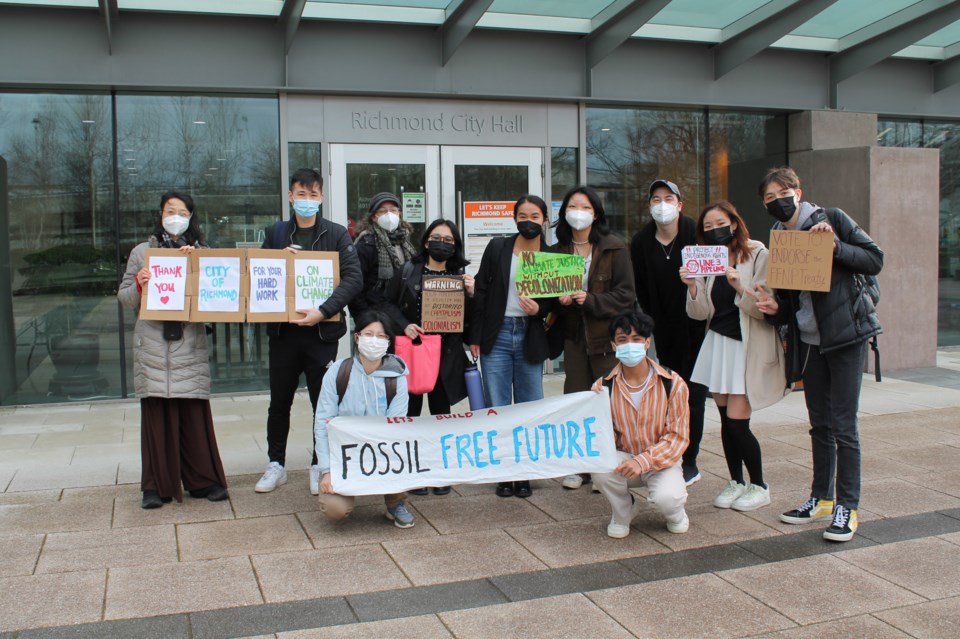A group of young people made a passionate and dramatic presentation to council Monday about global warming and the risks it poses to their generation – and others.
The group of young people were asking councillors to endorse a Fossil Fuel Non-Proliferation Treaty, a motion put forward by Coun. Michael Wolfe.
In the end, in a 5-4 vote, council decided to ask city staff to bring back more information in a month and then decide whether to endorse it.
Several Richmond students and activists attended Monday’s general purposes committee meeting to advocate supporting the international treaty.
The treaty aims to end new exploration and production of coal, oil and gas, “phase out” existing production of fossil fuels and create a transition solution for workers, communities and countries in the industry.
Six people shared their personal stories on how climate change is affecting the world and why they believe endorsing the treaty would be beneficial to the city.
City Couns. Michael Wolfe, Harold Steves, Chak Au and Carol Day voted to endorse the treaty and to further work on more climate change solutions.
However, Couns. Bill McNulty, Andy Hobbs, Alexa Loo, Linda McPhail and Mayor Malcolm Brodie all opposed endorsing the treaty at this time, saying there wasn’t enough information about it for council to make a decision right away.
Instead, city council sent the motion to city staff for referral and have it return to the agenda in one month after a report on the “analysis and specific implications of the treaty” is made.
“By referring this (motion) back, I don’t treat this as a time-waster or a deflection,” said Brodie, adding the referral to city staff will clarify all the implications for the treaty to be endorsed.
“I think we will get much farther by having a stronger motion and referral to staff will accomplish that.”
During the meeting, city council also boasted Richmond being “steps ahead” of other municipalities in the Lower Mainland in terms of working towards tackling climate change in the city.
Councillors highlighted that the city’s opposition to the jet fuel line and the Tilbury LNG expansion as well as its work on dykes being done around the city.
Despite the “disappointing” outcome of the meeting, Richmond students Naomi Leung and Sandra Chang said they were inspired by the speeches made by their peers and “understood where (councillors) were coming from.”
“I am in agreement with Coun. McNulty and others who presented on how further climate leadership must take place beyond endorsing the call for this treaty,” said Leung.
“During the meeting Mayor Brodie mentioned how there was not a day that passed where city council did not consider the climate emergency,” Leung said. “In this same manner, I want to see city councillors every day following up on phasing out fossil fuels, and working for a just transition for Richmond residents.”
Chang suggested that “miscommunication with the wording on the agenda” may have added to the council’s reluctance to endorse the treaty.
“This was clarified near the end of the meeting, but I understand that they are more concerned as to what it looks like for Richmond to phase out of fossil fuels,” said Chang.
Both youth said they will be researching and educating themselves in preparation of returning to city hall to talk about the treaty again next month.
The treaty has three pillars: “non-proliferation” by ending the exploration and production of coal, oil and gas, phasing out stockpiles of these fossil fuels in line with the Paris goal of keeping global warming down to 1.5 degrees Celsius below pre-industrial times and a “peaceful transition” which would fast track solutions and provide a just transition for workers, communities and countries.



